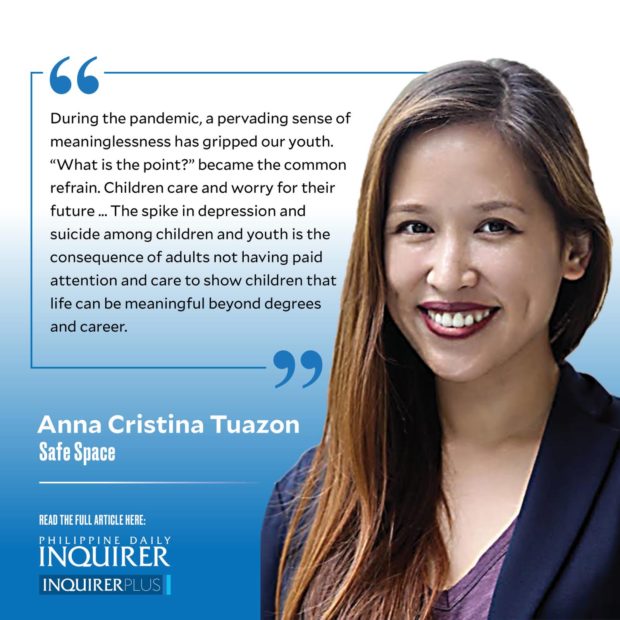Finding meaning in our past
We start the month of November by honoring our departed loved ones. It also happens to be National Children’s Month. This month is an interesting bookend: it commemorates those who came before us and strives to protect those who will come after.
I was asked recently, in a talk about grief, how one can pay respects to their departed at a time when they are not allowed to visit their gravesites. Outside of any specific religious instruction, I answered that one can always connect with our loved ones no matter the place because they live on in our memories (hence why many cultures place importance in remembrance of ancestors).
Article continues after this advertisementIn object relations theory, we call this internalized objects. People who have made a significant mark in our lives become internalized objects—their characteristics and voices immortalized in our psyche, guiding us far beyond the original source’s lifetime. Most of us have internalized our parents and those who’ve cared for us when we were young. Perhaps, as adults, we still see our father as the strict disciplinarian even as the present father in front of us has significantly mellowed into a doting grandfather. We’ve also internalized the first adult who believed in us — be it a teacher, neighbor, or family friend — that nourished our emerging self-esteem. We also took in the scary nun (if you had a Catholic school upbringing) who scolded us whenever we misbehaved, instilling in us a sense of shame and guilt that would permeate our adult lives. We internalize the good, the bad, and everything in between. For a healthy psyche, we can choose to internalize those that we want to keep and let go of objects that no longer serve us. In this way, we can choose to keep our loved ones close to us, finding a home in our remembrance. Immortality does not reside in monuments but in people’s memories.
There is another reason to commemorate: to gift our children with a sense of meaning to their lives. During the pandemic, a pervading sense of meaninglessness has gripped our youth. “What is the point?” became the common refrain. Children care and worry for their future. Young children come to me worrying about the job market — even when they have yet to enter high school. They wonder about the meaningfulness of a 9-to-5 life. Surprisingly, a lot of them at this age have already sworn off having children, feeling the responsibility of bequeathing such a life to others. The spike in depression and suicide among children and youth is the consequence of adults not having paid attention and care to show children that life can be meaningful beyond degrees and careers.
Just like how Scrooge in “A Christmas Carol” found meaning in his present life by visiting the past and the future, we, too, must allow our children to travel through time. Only we don’t need ghosts to travel through time; we just need our collective stories. Remembering our ancestors allows them — and us — to see the bigger picture. It is important to know where we came from and how we got here. We get so focused — and distressed — by the immediate problems in our own lives that we fail to see our role in a much bigger drama: the unfolding story of generations. It is like playing chess but failing to see the entire chessboard. We need to see where we are in the context of the other pieces in order to realize our next move.
Article continues after this advertisementBy taking in our collective history, we experience the interconnectedness of things past, present, and future. It helps us recognize how fatefully intertwined our lives are with each other and how our influence in this world will affect future generations. We are not the whole story but we are always part of it. As such, I truly believe there is no such thing as a wasted life. Whether we achieve academic degrees and honors, whether we make a lot of money or struggle financially, whether we feel our importance or get stung by our insignificance, each life still plays a role. As in chess, even a pawn can make a difference.
Making use of collective history also reminds us that life is not linear. It is not just that we want to go back to the way things were or that we wish for a much better future than our present: we simply want to be in equilibrium. We need to feel balanced. People need to experience life as a series of rhythms and cycles to trust that equilibrium is within reach. When people fall, they need to trust that it is possible to get back up again. Because history has told us so. History shouldn’t just remind us of our tragedies but also of our power.

















